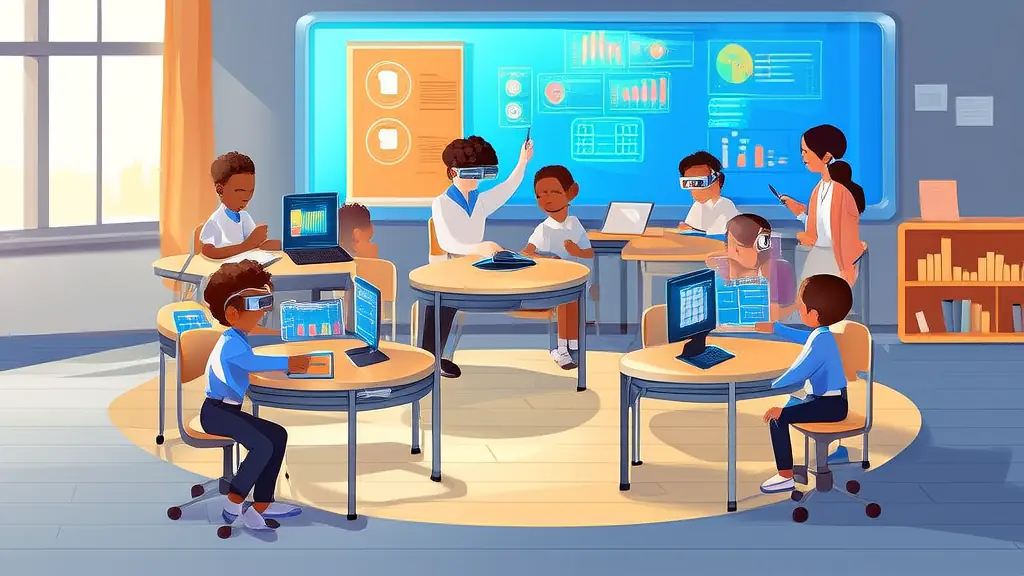
Empowering the Future: Navigating K12 Education in 2025
Welcome to our exploration of K12 education, where we dive into the latest trends, methodologies, and technologies that are shaping the future of learning. As we stand on the brink of a new era in education, it's essential for parents and educators to stay informed about the best practices and tools available to support our children's growth and development. In this blog post, we will cover the most effective teaching methods, insights from child development research, the role of educational technology, and practical tips for both parents and teachers. Let's embark on this journey together!
Latest Teaching Methodologies and Their Effectiveness
The landscape of K12 education is constantly evolving, with new teaching methodologies emerging to better meet the diverse needs of students. One of the most promising approaches is Project-Based Learning (PBL). PBL encourages students to engage in real-world problems and challenges, fostering critical thinking, collaboration, and problem-solving skills. Research has shown that PBL can significantly improve student engagement and academic performance, as it makes learning more relevant and meaningful.
Another effective methodology is Flipped Classroom, where students watch video lectures or read materials at home and use class time for hands-on activities, discussions, and problem-solving. This approach allows for more personalized and interactive learning experiences, which can be particularly beneficial for students who need extra support or those who thrive in a more dynamic environment.
Child Development Insights and Research
Understanding child development is crucial for creating an effective and supportive learning environment. Recent research has highlighted the importance of social-emotional learning (SEL) in K12 education. SEL focuses on developing students' self-awareness, self-management, social awareness, relationship skills, and responsible decision-making. Studies have shown that SEL programs can lead to improved academic outcomes, reduced behavioral issues, and enhanced overall well-being.
Additionally, the concept of growth mindset has gained significant traction in recent years. Developed by psychologist Carol Dweck, a growth mindset emphasizes the belief that abilities and intelligence can be developed through dedication and hard work. Schools that foster a growth mindset culture see increased resilience, motivation, and a willingness to take on challenges among their students.
Educational Technology Trends
Technology continues to play a pivotal role in K12 education, offering innovative ways to enhance learning and engagement. Artificial Intelligence (AI) is one of the most transformative trends, with AI-powered tools providing personalized learning experiences, adaptive assessments, and real-time feedback. For example, platforms like DreamBox and Carnegie Learning use AI to tailor math instruction to individual students' needs, resulting in improved learning outcomes.
Virtual Reality (VR) and Augmented Reality (AR) are also making waves in the classroom. These immersive technologies can transport students to historical events, scientific phenomena, and cultural landmarks, making learning more engaging and memorable. Google Expeditions, for instance, offers virtual field trips that allow students to explore the world without leaving the classroom.
Practical Tips for Parents and Teachers
For parents, staying involved in your child's education is key. Here are some practical tips:
- Communicate regularly with teachers to stay informed about your child's progress and any areas that may need additional support.
- Create a dedicated study space at home that is quiet, organized, and free from distractions.
- Encourage a love for reading by setting aside time each day for family reading and discussing books together.
- Support social-emotional learning by modeling and reinforcing positive behaviors, such as empathy, kindness, and resilience.
For teachers, here are some actionable strategies:
- Integrate technology thoughtfully to enhance, not replace, traditional teaching methods. Use tools that align with your curriculum and learning objectives.
- Foster a growth mindset culture by praising effort and persistence, rather than just outcomes. Encourage students to view challenges as opportunities for growth.
- Implement project-based learning to make learning more relevant and engaging. Design projects that connect to real-world issues and allow for creative problem-solving.
- Prioritize social-emotional learning by incorporating SEL activities and discussions into your daily routine. Create a safe and inclusive classroom environment where all students feel valued and supported.
Success Stories and Case Studies
One inspiring success story comes from the High Tech High School in San Diego, California. This school has fully embraced project-based learning, with students working on interdisciplinary projects that culminate in public exhibitions. The results have been remarkable, with high levels of student engagement, creativity, and academic achievement. High Tech High has become a model for other schools looking to implement PBL effectively.
Another case study is the New York City Department of Education's Social-Emotional Learning Initiative. By integrating SEL into the curriculum and providing professional development for teachers, the initiative has seen a significant reduction in disciplinary incidents and an increase in student well-being and academic performance. This program demonstrates the power of a holistic approach to education that addresses both academic and social-emotional needs.
Conclusion
In the ever-evolving landscape of K12 education, it's crucial for parents and educators to stay informed and adapt to the latest trends and research. By embracing effective teaching methodologies, understanding child development, leveraging educational technology, and implementing practical strategies, we can create a more engaging, supportive, and successful learning environment for our children. Let's continue to work together to empower the next generation and shape a brighter future for all.
Join the conversation and share your thoughts and experiences in the comments below. Together, we can make a difference in the lives of our students and build a stronger, more resilient educational community.